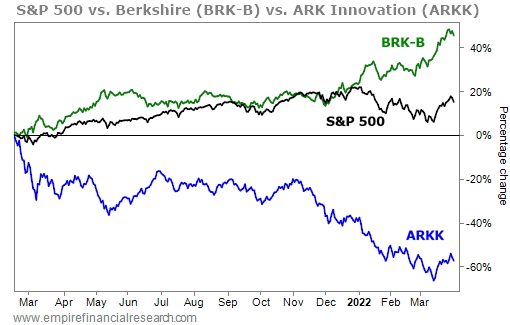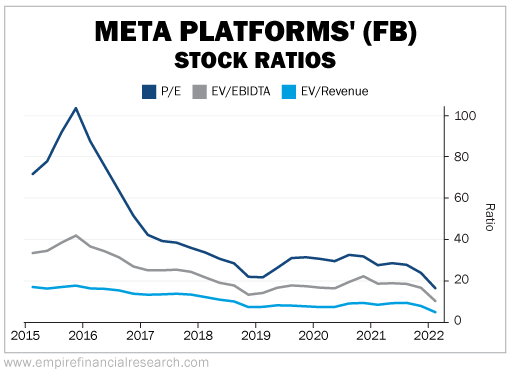
Three reasons why I think there could be a reversal toward growth stocks; Why Permanent Daylight-Saving Time Is Bad for Your Health; My experience with sleep deprivation
1) This afternoon, I'm presenting the chart below at a conference in Washington, D.C...
This chart compares the performance of Cathie Wood's ARK Innovation Fund (ARKK), a good proxy for high-growth stocks, from the day it peaked on February 12 last year, versus Warren Buffett's Berkshire Hathaway (BRK-B), a good proxy for value stocks:
As you can see, over the last 13 and a half months, Berkshire has outperformed by more than 100 percentage points, which sort of blows my mind...
It also makes me think that a reversal might occur, for three reasons:
First, Berkshire is no longer undervalued. It's now trading at almost exactly my estimate of its intrinsic value, which I calculated in two ways in my March 2 e-mail. So while I think it's a solid long-term hold, I wouldn't be adding to it here.
Second, at least some beaten-down growth stocks are downright cheap. Take Meta Platforms (FB), for example. On a price-to-earnings (P/E), enterprise value ("EV")-to-earnings before interest, taxes, depreciation, and amortization ("EBITDA"), and EV-to-revenue basis, the stock is currently trading at its lowest valuation level ever, as you can see in this chart:
Heck, Meta is much cheaper than IBM (IBM), which has been a total value trap for more than two decades.
Here's the math: Meta's enterprise value is $587 billion ($620 billion market cap, minus $48 billion in cash plus $14 billion in "operating lease liabilities," a form of debt). And last year it had $55 billion in EBITDA ($47 billion of operating income plus $8 billion of depreciation and amortization), so the stock today trades at 10.7 times EV/EBITDA.
The same figures for IBM are a $167 billion enterprise value and $11.2 billion in EBITDA, for a multiple of 14.8 times.
A lousy business like IBM should trade at a huge discount, not premium, to Meta – which is one of the greatest businesses of all time.
Finally, in yesterday's e-mail I outlined one more reason why I think we could see a reversal toward growth stocks:
I have sources with contacts in the Ukrainian military who tell me that the headlines about demoralized and disorganized Russian forces taking big losses are, if anything, understated. This leads me to believe that the odds are higher than most people think of a ceasefire in the near future followed by a peace deal, which would likely lead to the mother of all relief rallies.
In such a rally, I think the most beaten-down (i.e., growth) stocks would jump the most.
2) This Wall Street Journal article makes it seem like we should switch permanently to standard time, not daylight-saving time: Why Permanent Daylight-Saving Time Is Bad for Your Health, Sleep Scientists Say. Excerpt:
Permanently moving to daylight-saving time is likely to cause more harm than good when it comes to our health, sleep science indicates.
For years, researchers have bemoaned the biannual changing of the clocks, saying shifting just one hour is linked to a slew of negative health effects, including an increased risk of heart attack and stroke. But when the U.S. Senate recently passed a bill to make daylight-saving time permanent, sleep experts became more alarmed.
Legislators picked the wrong time, they say.
Our internal clocks are connected to the sun, which aligns more closely with permanent standard time, says Muhammad Adeel Rishi, a pulmonologist and sleep physician at Indiana University. When the clocks spring forward, our internal clocks don't change but are forced to follow society's clock rather than the sun. DST is like permanent social jet lag.
Dr. Rishi is one of the authors of a 2020 position statement from the American Academy of Sleep Medicine, a professional society, supporting making standard time – not daylight-saving time – permanent.
"Of the three choices – permanent daylight-saving time, permanent standard time, or where we are now, which is switching between the two – I think permanent DST is the worst solution," says Phyllis Zee, professor of neurology and director of the Center for Circadian and Sleep Medicine at Northwestern University Feinberg School of Medicine.
3) Speaking of sleep, in my April 12 e-mail last year, I wrote the following...
I have personal experience with very scary things that can result from sleep deprivation. But first, a little background...
In my August 14, 2020 e-mail I included an excerpt from my forthcoming book (due out next month!), The Art of Playing Defense, about a new revelation for me: the importance of getting at least eight hours of sleep every night. Failing to do so can lead to all sorts of terrible long-term consequences, as I wrote:
For most of my adult life, I used to feel guilty about getting anything more than six hours of sleep each night. I know a handful of people – like my friend Wendy Kopp, with whom I worked starting Teach for America in 1989-90 – who perform at super high levels yet only sleep four hours a night. How I envy them – I would pay a lot of money for a pill that allowed me to do this!
A few years ago, I tried to train myself to function on six hours of sleep, staying up until midnight and setting my alarm for 6 a.m., but it didn't work – it just made me tired all the time and I could tell my brain wasn't functioning 100%.
So I went back to my usual seven to seven-and-a-half hours... and feeling guilty... until I saw a 19-minute TED Talk last year by Matt Walker called "Sleep Is Your Superpower."
In it (and in his book that I subsequently read, Why We Sleep: Unlocking the Power of Sleep and Dreams), Walker shared the results of numerous studies, all of which show the critical importance of getting at least eight hours of sleep – and the terrible consequences of sleep deprivation.
Premature aging ("the shorter your sleep, the shorter your life"). Early onset dementia like Alzheimer's. Reduced ability to absorb, process, and remember things. Impotence. A suppressed immune system, resulting in higher cancer risk. Increased chances of auto accidents, suicides, cardiovascular disease, and heart attacks.
Walker concluded:
Sleep, unfortunately, is not an optional lifestyle luxury. Sleep is a non-negotiable biological necessity. It is your life-support system, and it is Mother Nature's best effort yet at immortality.
And the decimation of sleep throughout industrialized nations is having a catastrophic impact on our health, our wellness, even the safety and education of our children.
It's a silent sleep-loss epidemic and it's fast becoming one of the greatest public health challenges that we face in the 21st century.
Walker's wisdom changed my life – seriously! Instead of strategizing how to get less sleep, I now try to get more. Rather than viewing it as a wasteful luxury, eight hours of sleep is now the minimum I try to get each night – and nine is even better!
While I am, of course, only a sample size of one, I can tell you that ever since I started getting more sleep, I feel more energetic and stronger, both physically and mentally.
What I neglected to discuss in my book, however, was the effect of short-term sleep deprivation. Even one or two nights of limited sleep – like pulling an all-nighter to complete a deal – leaves most peoples' brains the equivalent to being legally drunk. Think about that before you get behind the wheel when you're tired...
And more than a few nights of sleep deprivation can trigger a "hypomanic episode" – I know, because it's happened to me three times in the past decade, all during periods when I've been under great stress and had difficulty sleeping (getting just two to six hours per night over a week or more).
The most recent was a year ago, when I was volunteering all day every day at the Samaritan's Purse field hospital in Central Park at the same time that the stock market was cratering. Basically, I was juggling two full-time, highly stressful/emotional jobs – and it pushed me to the edge...
This website's description of hypomania almost perfectly describes the state I was in:
Hypomania is an abnormally revved-up state of mind that affects your mood, thoughts, and behavior...
A hypomanic episode commonly manifests with unusual gaiety, excitement, flamboyance, or irritability, along with potential secondary characteristics like restlessness, extreme talkativeness, increased distractibility, reduced need for sleep, and intense focus on a single activity.
Hypomanic episodes are very dangerous for at least three reasons:
- They can grow into full-blown mania and/or be a sign of bipolar disorder,
- They can lead to terrible business decisions (e.g., making overly optimistic sales forecasts) and/or destructive behavior (e.g., breaking the law, blowing up important relationships), and
- The person experiencing the hypomania might not want to end it. During my episodes, I was incredibly productive (that's what having four extra hours a day will do, going from eight hours of sleep to four!) and creative (in my frazzled state, I had far more outside-the-box ideas than usual – some were bad, but others were great).
Fortunately, I have a wonderful, endlessly patient wife, plus a great shrink. My nightly check-ins with him, along with the medicine he prescribed me (and Ambien), brought me back from the edge a year ago – far more quickly than in the previous two episodes.
Hypomanic episodes are scary and I don't ever want to go through another one, so my wife and I now carefully monitor both my sleep and my behavior for warning signs.
Best regards,
Whitney
P.S. I welcome your feedback at WTDfeedback@empirefinancialresearch.com.


